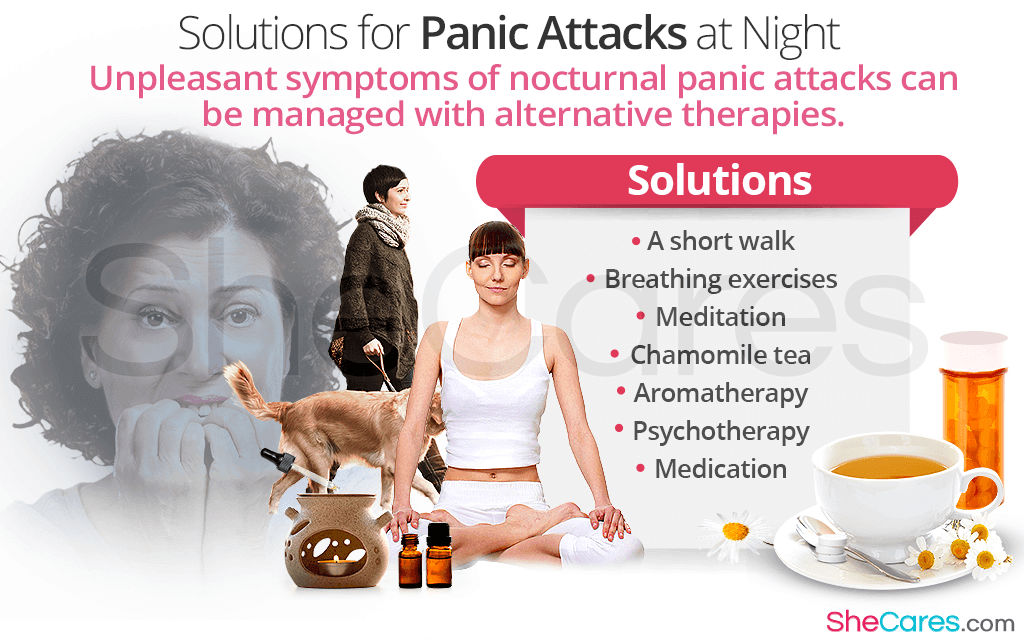The symptoms of nighttime panic attacks are the same as those happening during the day, but they seem more frightening since they brutally wake women up in a state of panic, causing a lot of distress and confusion.
Even though they do not last more than a few minutes, nocturnal panic attacks can prevent women from getting a good night sleep and add to the anxiety and exhaustion. Continue reading to discover the causes of panic attacks at night, as well as the most common solutions to manage them.
Causes of Panic Attacks at Night
Science does not distinguish between different causes of panic attacks at night and those occurring in the day, because the unique characteristic of panic attacks is that occur unexpectedly and often without a clear reason. However, certain lifestyle habits and conditions can make women more prone to experiencing panic attacks during sleep:
Drinking caffeine soon before going to sleep can speed up your heart rate, which might resemble an upcoming panic attack. Some women might start stressing out that they are about to have an attack, which can ironically trigger one.
Difficult experiences or stress might accumulate during the day and then come up to the surface during sleep when our mind is processing them.
Alcohol and drug abuse can disrupt the sleeping cycles and trigger nocturnal panic attacks.
Hormonal imbalance during menstruation, pregnancy, or menopause might also contribute to frequent panic attacks at night due to estrogen and progesterone fluctuations.
Other possible causes of daytime and nighttime panic attacks might include co-morbidity with other mental health illnesses, certain physiological dysfunctions, or genetic inheritance.
Panic attacks at night are often confused with other medical conditions, such as an obstructive sleep apnea, sleep terrors, or nocturnal epilepsy, but since they occur in different sleep phases, they are considered separate and non-related conditions.Solutions for Panic Attacks at Night
Stress and anxiety are one of the most common causes of panic attacks at night, so the focus should be placed on reducing tension and clearing the mind off of any residual worries that might trigger nighttime panic attacks. Here are some of the ways to do it:
If you had a stressful day and you feel tense, consider taking a short walk out in the fresh air before going to bed. A few stretches and exercises at home to release the accumulated energy might also do the trick.
Finding a quiet moment to close your eyes and do some breathing exercises in the evening is another good way to reduce tension and disperse the anxious thoughts.
Spending a few minutes in bed on meditation before falling asleep might help you release stress accumulated during the day and bring more calmness to your mind.
Try not to drink coffee and alcohol at bedtime. Instead, brew a cup of chamomile tea and sip it at bedtime to feel more relaxed and calm, especially after a stressful day.
Even a short aromatherapy session with essential oils, such as chamomile or jasmine, can help you find your balance and relax before you head off to bed.
Psychotherapy sessions can help you take more control over your thoughts and preventing them from escalating to the point of triggering a panic attack during the night as well as during the day.
Medication can also relieve nocturnal panic attacks. It typically involves the use of antidepressants, anxiolytics, benzodiazepines, or beta-blockers.
Nocturnal panic attacks might lead to sleep deprivation. Some women fear being awakened by a panic attack, so they start limiting sleep, which increases their fatigue, stress, and anxiety. That prolonged stress, in turn, triggers more frequent and severe panic attacks. Fortunately, women of all ages can find appropriate treatment for panic attacks by using some of the solutions mentioned above and prevent them from running their life.
